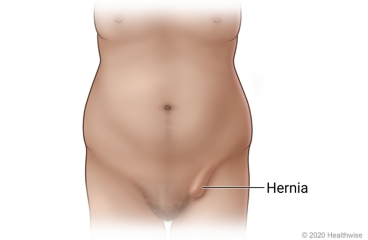What is inguinal hernia repair?

Inguinal hernia repair fixes a condition in your groin called a hernia, which is a bulge under the skin. A hernia happens when you have a weak spot in the groin muscle and a piece of your intestines or the tissues around them pokes through the muscle. This can be painful.
You may have pain when you're active. Or it may be painful when you strain during a bowel movement or lift something heavy.
Surgery repairs the hernia. It can also prevent serious problems that can happen if an organ or tissue gets stuck in the hernia.
The doctor may make some very small cuts (incisions) and use a thin, lighted scope and small tools. This is laparoscopic surgery. Or the doctor can fix a hernia through one incision made near it. This is called open surgery. In either type of surgery, if your hernia is bulging, the bulge is pushed back into place. The doctor then sews the healthy tissue back together. Often a special patch is used to support the weak spot.
Laparoscopic surgery leaves several small scars. Open surgery leaves one long scar. The scars fade with time.
You can probably return to light activity after 1 to 3 weeks. How long it takes will depend on the type of surgery.
How do you prepare for surgery?
Surgery can be stressful. This information will help you understand what you can expect. And it will help you safely prepare for surgery.
Preparing for surgery
- Understand exactly what surgery is planned, along with the risks, benefits, and other options.
- Tell your doctor ALL the medicines, vitamins, supplements, and herbal remedies you take. Some may increase the risk of problems during your surgery. Your doctor will tell you if you should stop taking any of them before the surgery and how soon to do it.
- If you take aspirin or some other blood thinner, ask your doctor if you should stop taking it before your surgery. Make sure that you understand exactly what your doctor wants you to do. These medicines increase the risk of bleeding.
- Make sure your doctor and the hospital have a copy of your advance directive. If you don’t have one, you may want to prepare one. It lets others know your health care wishes. It’s a good thing to have before any type of surgery or procedure.
- Be sure you have someone to take you home. Anesthesia and pain medicine will make it unsafe for you to drive or get home on your own.
What happens on the day of surgery?
- Follow the instructions exactly about when to stop eating and drinking. If you don't, your surgery may be canceled. If your doctor told you to take your medicines on the day of surgery, take them with only a sip of water.
- Take a bath or shower before you come in for your surgery. Do not apply lotions, perfumes, deodorants, or nail polish.
- Do not shave the surgical site yourself.
- Take off all jewelry and piercings. And take out contact lenses, if you wear them.
At the hospital or surgery center
- Bring a picture ID.
- The area for surgery is often marked to make sure there are no surgical site errors.
- You will be kept comfortable and safe by your anesthesia provider. The anesthesia may make you sleep. Or it may just numb the area being worked on.
- The surgery will take about 1 to 2 hours.
When should you call your doctor?
- You have questions or concerns.
- You don't understand how to prepare for your surgery.
- You become ill before the surgery (such as fever, flu, or a cold).
- You need to reschedule or have changed your mind about having the surgery.
Where can you learn more?
Go to http://www.healthwise.net/patientEd
Enter P932 in the search box to learn more about "Inguinal Hernia Repair: Before Your Surgery".
Current as of: October 19, 2024
Author: Ignite Healthwise, LLC Staff
Clinical Review Board
All Ignite Healthwise, LLC education is reviewed by a team that includes physicians, nurses, advanced practitioners, registered dieticians, and other healthcare professionals.

